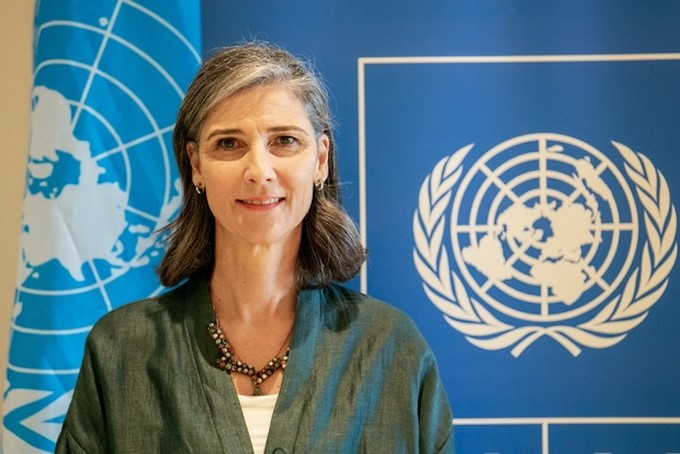Ms. Ramla Khalidi, UNDP Resident Representative in Vietnam, hopes that with a new governmental framework, Vietnam will be motivated to innovate and expand cooperation in agriculture and environmental protection.
Ms. Ramla Khalidi - Resident Representative of the United Nations Development Program (UNDP) in Vietnam affirmed that the merger of the Ministry of Agriculture and Rural Development (MARD) and the Ministry of Natural Resources and Environment (MONRE) is a great opportunity for Vietnam to accelerate progress toward achieving national targets on SDG 14 (Life Below Water) and SDG 15 (Life on Land).
Speaking to Vietnam Agri & Nature Newspaper, Ms. Ramla Khalidi said that integrating these two key ministries would foster a more integrated and holistic approach to natural resource management, aligning policies on land use, forestry, water resources, and marine conservation. This merger provides an opportunity for enhanced coordination in addressing deforestation, biodiversity loss, and water pollution–key challenges that have previously required cross-ministerial collaboration.
 Ms. Ramla Khalidi - Resident Representative of the United Nations Development Program (UNDP) in Vietnam. Photo: UNDP
Ms. Ramla Khalidi - Resident Representative of the United Nations Development Program (UNDP) in Vietnam. Photo: UNDPThe UNDP has accompanied the Vietnamese Government in many programs on forest protection, biodiversity conservation and water pollution treatment. A unified institution can also enhance policy coherenceand streamline regulations and improve the efficiency of policy implementation, reducing overlaps and inconsistencies and enabling efficient use of the Government’s human and financial resources.
“It will be important to ensure that technical expertise and institutional mandates remain strong during the transition and under the new and streamlined structure. Progress on SDG 14 and SDG 15 requires specialized knowledge in areas such as marine ecosystem conservation, land degradation, and climate adaptation,” Ms. Khalidi said.
The UNDP representative analyzed that with effective management, the restructuring can maintain momentum for ongoing initiatives, strengthen coordination with international partners, and ensure a smooth transition in policy enforcement. Maintainingdedicated focus and resources for biodiversity conservation and ecosystem protection amidst these changes will be key.
UNDP stands ready to support Vietnam in achieving its commitments tosustainable development and climate resilience in the new era. The organization confirms that it will continue working closely with national departments and other key counterparts in the new ministry structure, focusedon four key areas.
First, sharing international experiences and technical assistance to support policy and institutional strengthening. UNDP can provide technical assistance in developing an integrated policy framework that aligns agriculture, forestry, and environmental protection strategies.
“We can help design mechanisms to ensure that biodiversity conservation, climate adaptation, and sustainable land-use planning remain central priorities within the newly merged institution,” UNDP representative affirmed.
Secondly, UNDP can support capacity-building programs for policymakers and technical staff to ensure that knowledge on marine and terrestrial ecosystem management, climate resilience, and sustainable agriculture is retained and enhanced. The organization can also facilitate South-South cooperation and exchange, connecting Viet Nam with other countries that have undergone similar institutional transitions.
Besides, UNDP can facilitate the adoption of integrated approaches to land and water management, promoting cross-sectoral collaboration and coordination. For example, this can involve supporting the enhancement of integrated coastal zone management plans, and promoting sustainable agriculture and forestry practices.
Lastly, UNDP can assist Vietnam in accessing climate finance and biodiversity funds, ensuring that ongoing projects continue to support Viet Nam’s achievement of SDG 14 and SDG 15. Pilot initiatives that demonstrate integrated land and water management approaches, can help the Vietnamese Government implement best practices in the post-merger landscape.
The year 2025 marks a significant milestone, as the United Nations will conduct a five-year review of progress toward the SDGs and outline a roadmap to achieve them by 2030. Over the past decade, Vietnam has consistently improved its ranking in SDG implementation. In 2024, the country’s Sustainable Development Index reached 73.32 points, ranking second in Southeast Asia, behind only Thailand. Up to now, Vietnam has completed 2 out of 17 sustainable development goals. Notably, Vietnam has high scores in several SDGs: SDG1 (No Poverty): Ending poverty in all its forms everywhere; SDG4 (Quality Education): Ensuring inclusive, equitable, and high-quality education for all; SDG11 (Sustainable Cities and Communities): Making cities and human settlements inclusive, safe, resilient, and sustainable; SDG12 (Responsible Consumption and Production): Ensuring sustainable consumption and production patterns; SDG13 (Climate Action): Taking urgent action to mitigate or adapt to climate change and its impacts. |